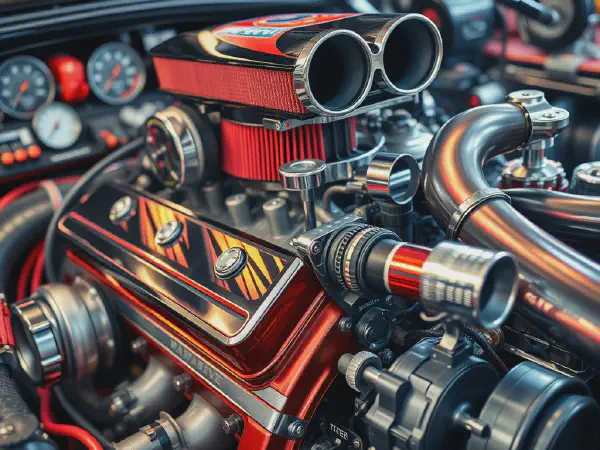Uncover Secrets Under the Hood: Boosting Car Horsepower

Increasing Car Horsepower: A Comprehensive Guide
Increasing car horsepower is a pursuit that excites many automotive enthusiasts and everyday drivers alike. Horsepower is a critical measure of a vehicle's power output, directly impacting acceleration, towing capacity, and overall performance. Understanding how to increase horsepower can lead to a more thrilling driving experience and improved vehicle capabilities.
There are numerous ways to achieve the goal of increasing car horsepower, ranging from simple modifications to more complex upgrades. Whether you're looking to enhance your sports car's performance on the track or just want a bit more vigor in your daily drive, knowing which methods to employ can help maximize your vehicle's potential.
This guide delves into various techniques to increase car horsepower, including performance modifications, fuel efficiency enhancements, engine component upgrades, and suspension improvements. Additionally, it highlights the significance of regular maintenance in maintaining optimal horsepower levels.
Before embarking on the journey of increasing car horsepower, it is essential to set realistic goals based on your vehicle type and intended use. Horsepower increases often correlate with changes in torque, and understanding that balance will help inform your upgrades. From tuning the engine to enhancing fuel delivery, the opportunities for boosting horsepower are vast and varied.
It’s important to note that increasing horsepower often involves trade-offs, such as decreased fuel economy or increased wear on engine components. Thus, making informed decisions and considering the long-term implications of modifications is crucial for any car enthusiast.
Performance Modifications
One of the primary methods of increasing car horsepower is through performance modifications, specifically engine tuning techniques. Engine tuning can involve adjusting the engine's computer settings to enhance ignition timing, fuel maps, and air-fuel ratios. With proper tuning, even small adjustments can yield significant horsepower gains, providing a more responsive engine.
Additionally, installing cold air intake systems can serve as another effective means of increasing horsepower. These systems allow for cooler, denser air to enter the engine, thus improving combustion efficiency. A cold air intake can potentially add a few extra horsepower while also enhancing the engine's sound.
Furthermore, high-performance exhaust systems are critical in optimizing power output. A well-designed exhaust system reduces backpressure, allowing exhaust gases to exit more freely. This reduction can result in enhanced engine efficiency and a noticeable increase in horsepower, particularly in high-revving engines.
Fuel Efficiency Enhancements
Another angle to explore when increasing horsepower is through fuel efficiency enhancements. Using premium fuel can provide better performance due to higher octane ratings, preventing knock and allowing the engine to run more smoothly and powerfully. This is particularly beneficial for high-compression engines that require optimal fuel quality.
Fuel additives can also play a role in enhancing fuel efficiency and horsepower. These additives can clean the fuel injectors, reduce deposits in the combustion chamber, and improve overall fuel economy. By ensuring the fuel system is in excellent condition, drivers may experience an uptick in engine performance.
Additionally, optimizing air-fuel ratios can significantly affect horsepower. Achieving the ideal balance between air and fuel is critical for effective combustion. Tuning the engine to maintain optimal air-fuel ratios can prevent issues such as lean running conditions, which can cause poor performance and engine damage.
Engine Components Upgrades
Upgrading engine components is another effective strategy for increasing horsepower. Turbochargers, for instance, can dramatically boost an engine's power output. By forcing more air into the combustion chamber, turbochargers enable the engine to burn more fuel, resulting in higher horsepower levels.
High-performance camshafts are also worth considering. Upgrading to a camshaft designed for higher RPM ranges can optimize engine timing and improve airflow through the cylinders. This modification often leads to noticeable horsepower increases, especially in modified or racing engines.
Lightweight piston options are an additional upgrade that can enhance engine performance. By using lightweight materials, pistons can reduce the overall weight of the rotating assembly, allowing for quicker acceleration and improved RPM response. This, in turn, leads to an increase in horsepower.
Suspension and Handling Improvements
While horsepower tends to dominate discussions about performance, suspension and handling improvements can also impact the overall driving experience. Enhancements in suspension can increase traction, enabling better application of the engine's power to the road, ultimately maximizing the effectiveness of increased horsepower.
Installing strut bars and sway bars can improve chassis rigidity and stability, enhancing the car's cornering ability. Improved handling allows for greater confidence when accelerating out of corners, effectively making better use of the horsepower available.
Weight reduction strategies, such as removing unnecessary components or substituting lightweight materials, can further enhance the power-to-weight ratio. This optimization can lead to improved acceleration and overall performance, complementing horsepower gains from modifications.
Regular Maintenance Tips
Finally, regular maintenance plays a crucial role in maintaining and potentially increasing car horsepower. Regular oil changes ensure that the engine runs smoothly by reducing friction and wear on engine components. Clean and high-quality oil helps keep the engine healthy, promoting optimal performance.
Upgrading spark plugs can also contribute to improved horsepower. Performance spark plugs provide a more efficient spark, leading to better fuel combustion and more power from the engine. This small change can create noticeable improvements in throttle response.
Lastly, air filter maintenance is essential for keeping the engine breathing efficiently. A clean air filter allows for optimal airflow, while a clogged filter can restrict air intake, negatively impacting horsepower. Regularly checking and replacing air filters can ensure the engine operates at peak efficiency.
